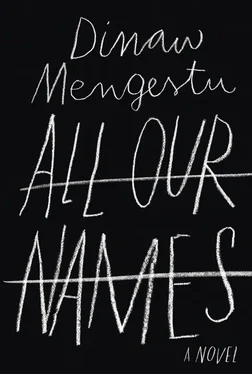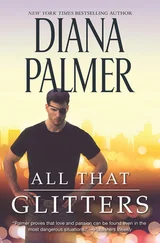“That’s where we belong,” he said, “in one of those expensive cafés with the rest of the students. Years from now, they will say, ‘That is where Isaac and Langston the Poet Professor met.’ ”
The owners of the Café Flamingo were rumored to be multiple things: Lebanese businessmen; distant cousins of the president, or one of his close allies. No one knew for sure, and it was better to believe that the café, and those who dined there, were in proximity to some form of power. The truth, as I learned later, was more simple and complex. The café had been opened by a French-American couple who fled the country after independence. The two middle-aged African women who worked there day in and day out were not the help, but the wives of the two brothers who had legally claimed the café as their own after its abandonment, and who for years had run the place as if it were their own. They did so, however, not as businessmen but as loyal friends and followers of a young man who had just returned to the capital after years of exile in England.
On the afternoon when Isaac and I decided to stop at the Flamingo, a pair of the marabou storks that hung lazily around the city were perched on the ground just in front of the café, staring at the four plastic flamingos that had been nailed into the dirt just outside the front door. They stretched their wings and cast their shadows over the plastic birds, and when nothing happened they began to fly slowly away. Those birds were harmless, but their elongated, pointed beaks suggested nature or time had denuded them; their ugly bald heads made them look like masters of prey. One of the students sitting outside on the plastic lawn chairs threw a spoon in their direction, and you could see, even though they were already almost a foot in the air, that they were afraid. They flapped their wings faster until they found refuge on the roof of a building across the street.
Whether any of the students noticed Isaac and me take our seats outside is hard to say. We aroused only the mildest curiosity. Had we walked off, no one would have thought of us again, but Isaac didn’t want it to be that way, and so it wasn’t. He chose a table next to a group of boys who had their wide, butterfly-collared shirts exposed to reveal the gold underneath. Two spoke with genuine English accents, different in register from the fraudulent ones often heard around the campus. All of them wore freshly polished shoes.
“This place is full of Alexes,” I said to him.
“I know,” he said. “That’s why we came here.”
Isaac clapped loudly to get the waitress’s attention. The boys stopped their discussion and turned toward him. They immediately saw us for the poor village boys that we were.
They started laughing at us in unison. A boy in a blue-and-white shirt stood and began to clap slowly while looking directly at us. The rest followed: some stood, a few sat, but all of them except one man were clapping and mocking us. The students sitting inside looked out the window to watch. Even though they didn’t know why, I’m sure they understood we were being humiliated.
Poor Isaac. He was outsized and outnumbered, but I didn’t know him well enough to understand that this made no difference to him.
“Don’t get up,” he said. “I know how to handle this.”
And so I sat while he made his way toward them. It was a slower, more tempered version of his usual lope. He paused mid-stride, bent down, and briefly grazed the ground with his right hand. No one other than me noticed he had picked something up. When he was a few meters away from the boys, who were applauding and looking directly at him as if he were merely the shell of a man, the form without the beating heart, he turned back to see if I was watching. I was; I had worked hard not to turn away.
Isaac took two more long strides, during which he aimed, wound his arm, and released the rock he had been carrying into the mouth of the boy in the blue-and-white shirt. The applause stopped in time to hear the bones in the boy’s jaw crack.
Isaac was taken down quickly. He held his ground as three, maybe four boys roughly the same size as him charged. I kept my eyes focused on him long enough to know that he made no attempt to run, and then I stopped looking. He was punched and kicked for several minutes. I heard the blows land. The beating would have lasted much longer had those boys not been ordered to stop by the older man who had been sitting near, but not exactly with them. When I turned back, the man had his arm around two of their shoulders and was walking them out of the café.
Isaac was still conscious, bleeding from his mouth and nose. His face and arms seemed to be swelling as I knelt next to his head.
“What should I do?” I asked him.
He tried to laugh, but his lungs refused.
“This is nothing,” he said. “Go home and pretend this never happened.”
One of the women who worked in the café and two men who took orders from her came to attend to him. She pressed into his ribs, chest, and stomach and placed a damp rag over his forehead. She gestured up with her hand and the men lifted Isaac slowly from his waist and shoulder.
I tried to follow them into the café but Isaac continued to mumble with what little breath he had that I should go home. I stopped once we reached the door. I was standing next to Isaac’s feet. One step farther back and I wouldn’t have heard him say, “We need you on campus.”
Two weeks passed before I saw Isaac again. I searched for him on campus and in our neighborhood, retracing the routes he was most likely to take. I had only a general sense of where his house should have been, so I wandered through the most obscure corners of our slum in the hope that I might hear his voice out of a window, or see his face in a crowd. At the end of the first week, I began to worry that his injuries were worse than I thought. Later, I felt certain that he had been brought into the café so he could be discreetly finished off, and there was always the fear, present from the beginning, that Isaac had been rounded up and thrown into a prison on a whim, or because of what he had done, and if that was true it was unlikely I would ever see him again.
Near the end of the second week, I thought I saw him lying on a mattress on the floor of a one-room home, naked except for a thin white blanket draped over his waist. I whispered through the open window, “Isaac, Isaac.” When the arm moved, I saw that it wasn’t Isaac. The boy was roughly our age and the same height and weight as Isaac, but with a deformed palate that must have made it hard for him to speak. He looked at me and waved. I waved back. I was so grateful that someone had actually noticed me that I stood there waving for another minute, perhaps much longer. Before Isaac, I had always been content to cast myself as the outsider, because only by such measures, I thought, could you break from the grips of the family and tribe around which you were supposed to order your life. I had ventured far away from home to live up to that idea without understanding that, inevitably, something had to be paid for it. Every day following Isaac’s absence, I was reminded that without him I made an impact on no one. I was seen, and perhaps occasionally heard, strictly by strangers, and always in passing. I was a much poorer man for this than I had ever thought.
Isaac made a dramatic return to campus on a Monday afternoon. He looked heroic as he walked through the front gates with dark bruises beneath both eyes, a gash across his pointed chin, and a patch of scabs across the right side of his face. He limped gracefully but with force, as if trying to show the damage wasn’t permanent. I watched as every head turned toward him. I knew the injuries were genuine, but still I thought, You’re doing a wonderful job, Isaac. By the time he reached me, there were pockets of students all across the main lawn whispering about him.
Читать дальше












